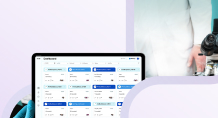Have you ever wondered where Europe’s next wave of healthcare innovation will spring from? In 2025, the answer points squarely at Bulgaria. What once ranked as an emerging market has transformed into a powerhouse for medical IT outsourcing. Sofia, the nation’s capital, blends historic architecture with sleek tech campuses. Streets bustle with software engineers, data scientists and medtech entrepreneurs.
By the end of 2023, Eurostat counted 126,100 Bulgarian ICT specialists—about 4.3 % of the workforce—funnelling their expertise into projects from AI‐driven diagnostics to blockchain‐backed drug traceability . The U.S. International Trade Administration praises Bulgaria’s “high‐quality talent pool” and “reasonable prices,” a compelling duo for any cost‐sensitive partner in the medical field .
This article dives into Bulgaria’s rise as a European hub for healthcare IT outsourcing. We’ll explore the nation’s EU milestones, its blend of skill and affordability, its thriving digital health ecosystem, and how top companies—and even national health systems—have harnessed Bulgarian expertise.
EU milestones: Schengen and the Euro

Bulgaria is no longer the backyard of the EU. It is its newest secret weapon. The country has managed to clear all milestones in European integration, which naturally comes with many economic benefits.
Schengen membership
When Bulgaria entered the EU in 2007, analysts predicted gradual economic convergence. Few expected a rapid IT boom. On January 1, 2025, Bulgaria lifted all land‐border controls to join the Schengen Area. Overnight, it erased visa requirements for 450 million EU travelers. Now, CEOs hop on trains or drive to Sofia for sprint planning sessions without border delays .
Eurozone entry
On June 19, 2025, EU finance ministers formally endorsed Bulgaria’s euro adoption, setting the stage for a January 1, 2026 launch. This milestone removes currency fluctuations from project budgets. Clients no longer need to hedge exchange risk when paying Bulgarian teams .
These moves reflect more than administrative shifts. They signal Bulgaria’s leap from EU periphery to active centre. Companies now tap into a market with full freedom of movement, a single currency and legal harmonization under EU directives.
Workforce dynamics: talent and costs
World‐class education
Bulgaria’s network of technical universities fuels its IT sector. Each year, thousands of graduates emerge fluent in Python, JavaScript and R, many with specialized master’s degrees in bioinformatics or medical image analysis. Their high English proficiency—over 90 % report conversational or better skills—ensures seamless collaboration with Western European and North American clients .
A 2024 Eurostat report shows 35.5 % of Bulgarians now possess basic digital skills, up by 6.7 % from the previous year. That uptrend illustrates how government initiatives and private academies pushed coding boot camps into secondary schools and vocational programs .
Owing to the fact that very well-rounded and maintained education system software designers, engineers and different experts in the IT industry represents the strongest population in the outsourcing industry.
Affordable expertise
Despite this talent surge, Bulgaria remains Europe’s most cost‐effective IT hub. In 2024, its average hourly labor cost stood at €10.6, compared to a €33.5 EU average . This gap translates into real savings: companies reduce development budgets by 30 % to 50 % without any hit to quality.
A flat 10 % corporate tax rate adds another layer of predictability. Executives know that a pound or dollar spent in Sofia stretches further than in any Western European city .
Still, the sector faces fierce competition for top talent. Reports indicate 46 % of firms struggle to fill open ICT roles, prompting universities and private trainers to launch new programs in AI, cloud architecture and cybersecurity . Sofia Univeristy has speareaded this by opening INSAIT – Bulgaria’s very own AI development institute. This pressure drives continuous skill upgrades, which benefits everyone—outsourcing partners included.
Building the healthcare IT ecosystem

National Health Information System (NHIS)
Bulgaria’s digital health journey began in earnest with the NHIS launch in December 2020. Doctors across 13,500 clinics now enter an average of 210,000 electronic health records each day. By mid‐2025, clinicians logged over 345 million patient files into the NHIS .
This unified system offers more convenience. It breaks down data silos between primary care, hospitals and laboratories. Researchers analyzing population health trends now access datasets spanning millions of entries. Policymakers use that insight to target public health campaigns with surgical precision.
Digital health and innovation cluster
Imagine a space where startups, universities and hospitals sit side by side. That vision became reality in 2022 with the Digital Health and Innovation Cluster. Over 100 members—including innovators like Kelvin Health and TrialHub—share resources, receive EU grants and co‐develop products.
Kelvin Health’s AI platform, for example, flags early cardiometabolic risk by analyzing thermal image patterns. TrialHub employs machine learning to match patients with suitable clinical trials, shrinking recruitment from months to weeks. Together, these companies demonstrate how a collaborative ecosystem speeds breakthroughs .
MedTech startups
Once, Bulgaria counted a dozen medtech startups. Today, it hosts over 40, a sign of the sector’s vitality. FindMeCure uses AI to connect rare‐disease patients with global trial opportunities. Checkpoint Cardio sells home‑use ECG monitors that sync with smartphones and feed data into the NHIS. Both companies attracted investment rounds from EU Horizon funds and private venture capital in 2024 .
These success stories create a virtuous cycle. They draw international attention, attract skilled expatriates back home, and encourage local students to pursue healthtech careers.
Ensuring security and stability
Data privacy and compliance
Handling patient data demands iron‑clad safeguards. Bulgaria enforces GDPR with strict penalties for breaches. In 2025, Parliament amended the Public Health Act to recognize telemedicine as standard care, granting legal cover for cross‑border services .
The Bulgarian National Cybersecurity Center now conducts regular audits of health infrastructure. Outsourced platforms must meet ISO 27001 standards and undergo penetration tests before deployment. This rigorous oversight reassures overseas clients that their data reside in a fortress.
Political and financial stability
Since 1997, Bulgaria’s lev has remained pegged to the euro at 1.95583 BGN, eliminating currency risk. Its NATO and EU memberships cement political stability and shared defense frameworks. Investors see Bulgaria as a low‑risk haven for long‑term R&D projects.
Multiple Tier III data centers ring Sofia and Plovdiv, offering 99.99 % uptime guarantees. Redundant power lines and fiber‑optic backbones ensure that even the most mission‑critical health applications keep running.
Europe’s digital decade and funding opportunities
Under the EU’s Digital Decade framework, Bulgaria aims to invest €2.2 billion—2.3 % of GDP—by 2030 in digital skills, AI adoption and cloud infrastructure. Although enterprise uptake trails the EU average, the roadmap allocates funds to close those gaps via training initiatives and co‑innovation hubs .
In 2024 alone, Bulgarian teams secured €48 million in Horizon Europe grants for projects in AI diagnostics, health data analytics and telehealth platforms—the highest haul among Southeastern European nations . This influx of funding bolsters startups, draws foreign partners and cements Bulgaria’s reputation as a research and development hotspot.
Real-World success stories
BGO Software’s success
BGO Software, founded in 2008 in Plovdiv, now supports the Department of Health in the UK , two of the top 3 largest pharma companies, CROs, and numerous HealthTech SMEs which gave us the opportunity to build expertise and deep industry knowledge.Our platforms aggregates current research, patient records and treatment protocols across 200 clinics. Oncologists save hours daily by accessing all necessary data in one dashboard.
Ivan Lekushev, BGO’s CEO, reports, “We integrate complex datasets with zero lag. That drives faster treatment decisions and better patient care” .
Bulgaria’s transformation from a cost‐effective call‐center locale to Europe’s fastest‐growing hub for medical IT outsourcing reads like a startup success story itself. It blends top‑tier STEM graduates with unmatched cost efficiency, topped by EU milestones that remove travel and currency barriers.
Its thriving digital health ecosystem—anchored by the NHIS and energized by public‑private clusters—spawns rapid innovation in telemedicine, AI diagnostics and medical IoT. Strict GDPR enforcement, currency stability and world‑class data centers ensure that patient data remain secure.
In 2025, choosing Bulgaria for healthcare software projects means tapping into a market that combines quality, speed and savings. Whether you aim to prototype a telehealth app, develop AI imaging tools or launch a blockchain‑enabled supply‑chain system, you’ll find the right talent and infrastructure here.
FAQs
Why choose Bulgaria over other Eastern European destinations?
Bulgaria combines the lowest ICT labor costs in the EU with a 10 % corporate tax and full EU/Schengen membership. Its universities produce a steady stream of English‑proficient specialists. Neighboring markets may offer similar talent, but few match Bulgaria’s blend of price, tax certainty and EU‐standard regulation.
How does Bulgaria compare to Ukraine for IT outsourcing?
While Ukraine also boasts strong developer talent, ongoing security concerns and its non‑EU status add risk. Bulgaria sits inside the EU and NATO, ensuring stable legal protections, data‑privacy standards (GDPR) and easier cross‑border collaboration without special visa or currency arrangements.
What project‐management practices prevail in Bulgarian teams?
Most Bulgarian firms follow Agile and Scrum, with certified Scrum Masters and Product Owners on staff. Daily stand‑ups align easily across a one‑ to two‑hour time‑zone gap with Western Europe, and many teams use JIRA, Azure DevOps or similar tools with English‐language interfaces.
Which languages and frameworks do Bulgarian healthcare developers specialize in?
You’ll find experts in C#/ASP.NET for enterprise health portals, Python and R for data science and AI diagnostics, JavaScript/TypeScript (React, Angular) for telemedicine front‑ends, plus FHIR and HL7 interfaces for EHR integration. Many teams also build mobile apps in Flutter and React Native.
How do Bulgarian teams handle IP and confidentiality?
Bulgaria enforces EU‑level IP and trade‑secret laws. Outsourced projects typically use standard NDAs, and many firms carry ISO 27001 or ISO 9001 certifications. Regular security audits, penetration tests and data‑encryption protocols (at rest and in transit) ensure code and patient data stay confidential.
Sources
European Commission. (2023). The Digital Decade: Bulgaria’s digital transformation roadmap. Publications Office of the European Union.
Retrieved from https://digital-strategy.ec.europa.eu/en/factpages/bulgaria-2025-digital-decade-country-report














